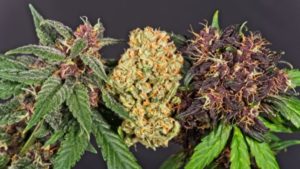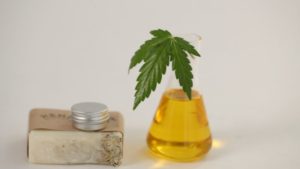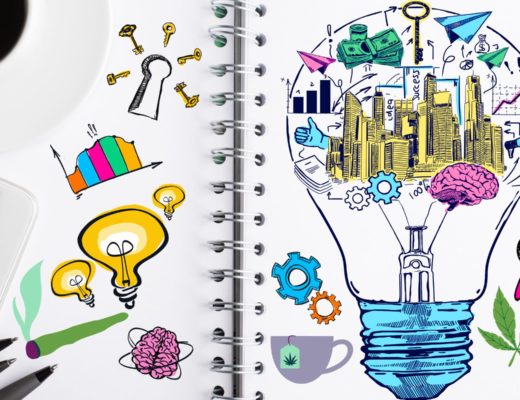While THC and THCA sound similar and can help similar conditions there is quite a bit of difference between the two molecules.
What is THC?
THC is short for tetrahydrocannabinol and is a chemical compound found in the resin of the cannabis plant.
THC is also the main psychoactive ingredient used to get you high. Whether consumed through ingestion or inhalation, THC binds to specific receptors in the brain called cannabinoid receptors.
How Does THC Work?
When THC interacts with your endocannabinoid system it can trigger a ton of positive reactions by causing the brain to release dopamine.
THC can take up to a few minutes to half an hour to take effect depending on how you consumed it. When it does you can expect feeling of:
- Euphoria
- Relaxation
- Heaviness (also known as “couch-lock”)
- Intensified auditory/visual effects
- Slowed perception of time
- Hunger
- Dry mouth
- Memory problems
- Dizziness
- Anxiety
- Paranoia
- Increased heart rate
The psychoactive effects of THC can last anywhere from a few hours to a whole day depending on how you consume it and how your body processes it.
 What is THC Used For?
What is THC Used For?
Medical THC is used to treat the following conditions:
- Appetite loss, Nausea and Vomiting – AIDs and Chemo patients are given THC infused medicine to help them with their debilitating nausea, vomiting and significant weight loss due to the side effects of their treatments. Studies have shown that THC is very effective in helping with these symptoms. It is prescribed so much that pharmaceutical companies are now making synthetic THC called Dronabinol.
- Chronic Pain – THC has been proven to be an effective pain reliever and is used for cancer patients and patients who suffer from sever chronic pain like fibromyalgia.
- Spasticity – Patients suffering from Multiple Sclerosis (MS) are give THC to help ease their extreme muscle spasms. THC is helpful because it affects the part of the brain that deals with movement.
- Depression – Studies have shown that THC and other cannabinoids can stimulate brain cell production. Because of this, medical professionals believe that when enough new brain cells are generated in the hippocampus depression can lessen or disappear.
- Brain Damage – Studies are finding that THC may have neuroprotective properties. Researchers are finding THC useful in protecting brain cells from damage in situations where there was a lack of oxygen, damage from toxic drugs or seizures.
- Cancer –THC is being studied for its potential to fight cancer. There have been studies that have shown cannabinoids decreasing tumor growth, preventing cancer cells from growing new blood vessels and decreasing metastasis of various types of tumors.
- Other conditions – There is hope that THC will have a hand in treating diseases like Alzheimer’s and dementia, Tourette syndrome, Huntington’s disease, PTSD, Parkinson’s disease, and many others.
What is THCA?
THCA is short for tetrahydrocannabinol acid and is a non-psychoactive cannabinoid that occurs naturally in cannabis plants.
THCA comes from CBGA. CBGA stands for cannabigerolic acid and is the mother of all cannabinoids. When a cannabis plant matures their enzymes convert the CBGA into one of the three; THCA, CBDA and CBCA.
THCA is too large to fit into the cannabinoid receptors and that is why it does not cause a high sensation.
What is THCA Used For?
THCA has a lot of potential health benefits, including:
- Anti-inflammatory properties in the treatment of arthritis and lupus
- Neuroprotective effects useful in the treatment of neurodegenerative diseases
- Antiemetic effects for combatting nausea and appetite loss
- Anti-proliferative effects, specifically noted in studies of prostate cancer
- Anecdotal evidence would also suggest that THCA could be effective in managing insomnia, muscle spasms, pain, and other related symptoms, though these claims have yet to be backed up by high-quality scientific research. (AC)
Potential conditions that THCA can help with are:
- Inflammation – Scientists have found that THCA, as well as other cannabinoids, mimics the effects of the body’s natural endocannabinoids that help calm inflammatory processes. This means that with further study, potential THCA benefits could include its use as an anti-inflammatory medication.
- Anticonvulsant – In 2017, researchers published a peer-reviewed article in the journal Epilepsy and Behavior that described how THCA may be used in combination with CBD for patients with epilepsy. In the patients that found relief with the THCA combination, doctors found that small doses were most effective. They also found that smaller doses of THCA were needed to get the same effects as larger doses of THC.
- Neuroprotective – Research is also ongoing to better understand THCA’s neuroprotective properties. In a study on brain cell degeneration and Parkinson’s disease, THCA, THC, and CBD all demonstrated the ability to increase cell counts and protect neurons. Another study pointed out that THCA’s benefits include “potent neuroprotective activity” and suggested that it be considered in treatment for Huntington’s disease, as well as other neuroinflammatory and neurodegenerative diseases.
- Anti-emetic – THC has long been used as an anti-nausea medication for people undergoing chemotherapy, but studies are revealing that THCA may be an even better choice. Not only is THCA more effective at treating nausea and vomiting, but it can also do so without the psychoactive effects caused by THC.
How is THCA consumed?
- One way is to trim raw cannabis buds and juice the plant matter. It is a quick and easy way to make the most out of THCA.
- Another method is to steep the bud in hot water and make THCA tea. Hot water will not get hot enough to turn THCA into THC. The temperature needs to reach above 250 degrees Fahrenheit.
- You can use the bud as a garnish on a food dish
- You can mix the bud in a salad dressing.
- You can mix the bud into your favorite smoothie
- You can also get it in topical creams at dispensaries.
 What is the difference between THC and THCA?
What is the difference between THC and THCA?
Did you ever wonder what would happen if you ate the raw bud or leaf of a cannabis plant? Would you get extremely high since you are consuming cannabis in its raw form?
It turns out that’s not the case. You can not get high from consuming raw cannabis. The reason is because in the raw form, cannabis is full of THCA which is the precursor to THC. THCA will turn into THC only when exposed to enough heat or has been through a long drying process.
THC and THCA are nearly identical in their chemical structure, but they are received through our cannabinoid receptors in different ways.
However, there are ways to accidentally turn THCA into THC and they are:
- If you leave raw cannabis out in the open where sunlight and room temps can expose the product to 77 degrees or higher for 10 days. Even cannabis kept in a semi dark room could elevate the THC level over a long period.
- If you cook THCA in the oven or stove top it will turn to THC. The temperature will have to be above 230 degrees Fahrenheit. Depending on how moist the bud is it could take between 30 – 90 minutes to activate.
So, if you’re looking to get high, look for THC but if you are looking for a compound that will aid in a medical condition much like CBD, try THCA.
Remember to always consult with your physician before trying anything new. You never know if it might interact negatively with a medicine, you are already taking.






No Comments